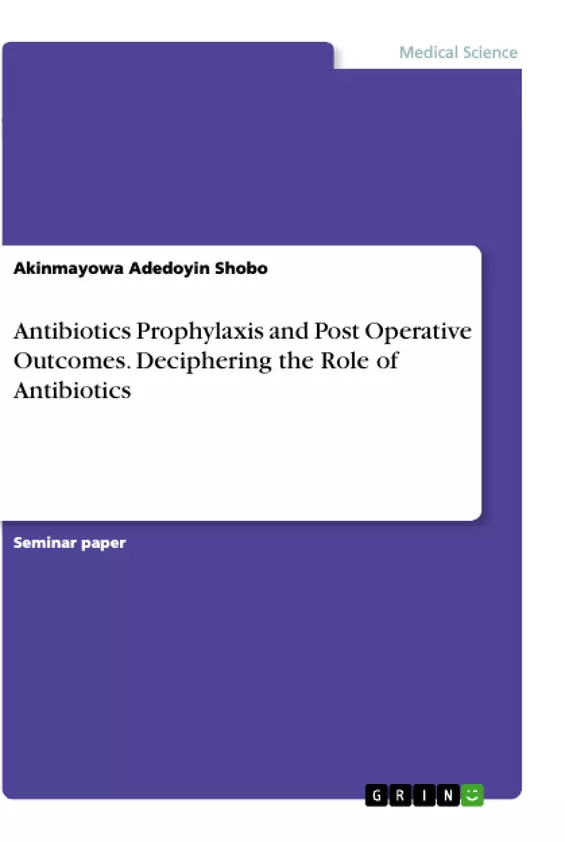Background: The focus of this work is to evaluate the effect of prophylactic antibiotics on patients’ post-operative outcome as reflected in the reduction of the rate of surgical site infections and other possible adverse outcomes.
A literature search was performed in MEDLINE, EMBASE, Cochrane Controlled Trials Register published in the Cochrane Library, and CINAHL databases. Outcomes of interest included presence of post-operative surgical site infections and other possible outcomes. In accordance with the PRISMA guidelines, forty full-text articles comprising randomized controlled trials and observational studies were subjected to qualitative analysis. Data were extracted based on the PICO investigative model.
In spite of the heterogeneity of the research design of several studies; there was a general consensus on the adverse outcomes of inappropriate administration of antibiotic prophylaxis. Various studies acknowledged the significance of the pharmacokinetics and pharmacodynamics of the recommended prophylactic antibiotics (in relation to SSI risk factors) in improving or worsening the post-operative outcome of patients – notably, protection against surgical site infections.
This study therefore strongly recommends on the adherence to global standard guidelines on antibiotics' prophylaxis in the conduct of perioperative procedures. More so, in view of the concerns raised about the standard guidelines, there is a need for more evidence-based principles on the use of antibiotics in surgery and continuous update of standard guidelines.
Inhaltsverzeichnis (Table of Contents)
- ABSTRACT
- INTRODUCTION
- Statement of problem
- Aim
- Research Question
- LITERATURE ANALYSIS
- Surgical Site Infections
- Epidemiology of SSIs
- Risk factors for SSIs
- Microbiology of SSIS
- Strategies for SSI prevention
- Brief Review of Antibiotic Prophylaxis
- CONCLUDING REMARKS
- REFERENCES
Zielsetzung und Themenschwerpunkte (Objectives and Key Themes)
This work aims to assess the impact of prophylactic antibiotics on postoperative outcomes, specifically focusing on the reduction of surgical site infections (SSIs) and other potential adverse events. The study employs a comprehensive literature review using multiple databases and applies qualitative analysis based on PRISMA guidelines and the PICO model.
- The impact of prophylactic antibiotics on surgical site infections (SSIs) and other adverse outcomes.
- The importance of appropriate administration of antibiotic prophylaxis.
- The relationship between pharmacokinetics and pharmacodynamics of prophylactic antibiotics and SSI risk factors.
- The need for evidence-based guidelines for antibiotic prophylaxis in surgery.
- The global healthcare burden of SSIs.
Zusammenfassung der Kapitel (Chapter Summaries)
The introduction provides a background on surgery as a medical procedure that disrupts tissue integrity and highlights the persistent problem of postoperative infections, particularly SSIs. The chapter discusses the prevalence and risk factors for SSIs, emphasizing the need for strategies to minimize or prevent these infections.
The literature analysis chapter delves into the epidemiology of SSIs, exploring various risk factors and the microbiology involved. It provides a detailed review of antibiotic prophylaxis as a preventative measure, examining both its benefits and potential drawbacks.
Schlüsselwörter (Keywords)
The key terms and topics explored in this work include surgical site infection, prophylactic antibiotics, perioperative infection control, pharmacokinetics, pharmacodynamics, and evidence-based guidelines.
Frequently Asked Questions
What is the main purpose of antibiotic prophylaxis in surgery?
The primary goal is to reduce the rate of surgical site infections (SSIs) and improve post-operative outcomes by administering antibiotics before the procedure.
What are the risks of inappropriate administration of prophylactic antibiotics?
Inappropriate use can lead to adverse outcomes, including increased risk of SSIs, antibiotic resistance, and potential drug toxicity.
How do pharmacokinetics and pharmacodynamics affect SSI prevention?
The timing and dosage must ensure that the antibiotic concentration in the tissues is sufficient to combat potential pathogens throughout the duration of the surgery.
What are the common risk factors for Surgical Site Infections (SSIs)?
Risk factors include the patient's underlying health status, the complexity of the surgery, the presence of foreign bodies, and environmental factors in the operating room.
What methodology was used for this literature review?
The study followed PRISMA guidelines, analyzing 40 full-text articles (randomized controlled trials and observational studies) using the PICO investigative model.
What is the study's recommendation for surgical procedures?
It strongly recommends strict adherence to global standard guidelines for antibiotic prophylaxis and calls for more evidence-based updates to these principles.
- Quote paper
- Akinmayowa Adedoyin Shobo (Author), 2020, Antibiotics Prophylaxis and Post Operative Outcomes. Deciphering the Role of Antibiotics, Munich, GRIN Verlag, https://www.grin.com/document/1066428



